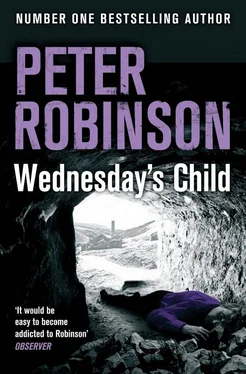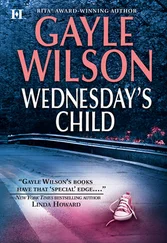Peter Robinson - Wednesday's Child
Здесь есть возможность читать онлайн «Peter Robinson - Wednesday's Child» весь текст электронной книги совершенно бесплатно (целиком полную версию без сокращений). В некоторых случаях можно слушать аудио, скачать через торрент в формате fb2 и присутствует краткое содержание. Год выпуска: 2006, ISBN: 2006, Издательство: Penguin Canada, Жанр: Полицейский детектив, на английском языке. Описание произведения, (предисловие) а так же отзывы посетителей доступны на портале библиотеки ЛибКат.
- Название:Wednesday's Child
- Автор:
- Издательство:Penguin Canada
- Жанр:
- Год:2006
- ISBN:978-0-14-305219-7
- Рейтинг книги:5 / 5. Голосов: 1
-
Избранное:Добавить в избранное
- Отзывы:
-
Ваша оценка:
- 100
- 1
- 2
- 3
- 4
- 5
Wednesday's Child: краткое содержание, описание и аннотация
Предлагаем к чтению аннотацию, описание, краткое содержание или предисловие (зависит от того, что написал сам автор книги «Wednesday's Child»). Если вы не нашли необходимую информацию о книге — напишите в комментариях, мы постараемся отыскать её.
Wednesday's Child — читать онлайн бесплатно полную книгу (весь текст) целиком
Ниже представлен текст книги, разбитый по страницам. Система сохранения места последней прочитанной страницы, позволяет с удобством читать онлайн бесплатно книгу «Wednesday's Child», без необходимости каждый раз заново искать на чём Вы остановились. Поставьте закладку, и сможете в любой момент перейти на страницу, на которой закончили чтение.
Интервал:
Закладка:
“Now, Elizabeth,” she said. “The nice policeman wants to talk to you about Gemma, to help him to find her. Just answer his questions. I’ll stay here with you.” She glanced at Banks to ask if he minded, and he nodded his agreement. Elizabeth took hold of Peggy Graham’s hand and stood beside her.
Banks crouched, hearing his knees crack as he did so, and rested his elbows on his thighs. “You know we’re trying to find Gemma,” he said. “Did she ever say anything to you about going away?”
Elizabeth shook her head.
“Or about anyone wanting to take her away?” Another shake.
“Did she have any older friends, big girls or big boys?”
“No.”
“Did she ever talk about her mummy and daddy?”
“It wasn’t her daddy.”
“Mr Poole?”
Elizabeth nodded. “She wouldn’t call him Daddy.”
“What did she say about him?”
“I don’t know.”
“Did she like him?”
“No.”
“Did he ever hurt Gemma?”
“She cried.”
“Why did she cry?”
“Don’t know.”
“Did he ever hurt her, Elizabeth?”
“I don’t know. She didn’t like him. She said he smelled and he always told her to go away.”
“When did he tell her to go away?”
“He said she was a sp… sp… a spilled cat.”
“A spilled cat? Do you mean ‘spoiled brat’?”
“Yes.”
“When did he say this?”
“He wouldn’t let her have the book.”
“What book?”
“She wanted a book and he wouldn’t let her have it. He threw her other books away.”
“Why?”
“She spilled some paint on his newspaper. It too dirty. He was angry. He threw her books away and he wouldn’t let her have any more.”
“What was too dirty, Elizabeth?”
“No. It too dirty.”
Banks looked at Peggy Graham. “I think she’s trying to say ‘at two-thirty,’” she said, frowning.
“Is that right?” Banks asked Elizabeth. “She spilled paint on his newspaper at two-thirty, so he threw her books away?”
She nodded.
“What were the books?”
“Story books. With pictures. Gemma likes reading. She reads to me. I’m not very good. Please find her.” Elizabeth started crying. Peggy Graham put an arm around her. “It’s all right, dear. The nice policeman will find Gemma. Don’t cry.”
Elizabeth sniffled a few moments longer, then wiped her nose on her sleeve and left the room. Banks sighed.
“What was all that about?” Peggy asked.
“I wish I knew. Thanks for letting me talk to her anyway. I hope she doesn’t stay upset.”
“Don’t worry. Elizabeth’s tough enough.”
Banks walked through the playground full of children. They were skipping, playing hopscotch, running around as usual, but like the ones coming out of the classroom they seemed much quieter, more subdued than children usually are.
He looked at his watch. Close to noon. Time to write up his notes before lunch with Jenny. Not that he had learned much from the teacher that he hadn’t known or suspected already. Gemma kept herself to herself, perhaps suffered neglect at home, but was probably not physically abused. Still, there was the business of the bruise. How had she got it? And what had Elizabeth meant about “at two-thirty” and Gemma’s books? Banks walked past the tower block with JESUS SAVES written in red on the wall and back to the unmarked car he had parked by the mobile unit.
III
Damn it, cursed Jenny Fuller. She had pulled up at the lights just in time and all the essays on the back seat had slid off onto the floor. So few of the students bothered with paper-clips or staples; it would be a hell of a job reshuffling them. If she hadn’t been in such a hurry to meet Banks it would never have happened. She was on the south-eastern edge of Eastvale, coming up to the roundabout by the Red Lion, and she only had five minutes to park and get to Le Bistro. Still, Alan would wait.
The lights changed and the car lurched off again. To hell with the papers. She shouldn’t be teaching until October anyway, and if it hadn’t been for those American students — those American students with odd ideas of academic timetables and thousands of dollars to spend on an English education — then she could have been relaxing on a beach somewhere.
She smiled to herself, imagining Alan Banks sitting at one of Le Bistro’s wobbly little tables, no doubt feeling out of place among the yuppie lunch crowd with their Perriers and portable telephones. He would be far more comfortable in the Queen’s Arms with a pie and a pint in front of him, not at a table covered in a coral cloth with a long-stemmed rose in a vase at its centre. But Jenny had been lecturing to the Americans all morning, and she was damned if she was going to be done out of the shrimp provençale and the glass of white wine she had promised to treat herself.
Jenny remembered her surprise the first time the Eastvale CID had brought her into a case, involving a peeping Tom, three years ago. She had guessed (correctly) that they wanted a visible female presence as a sop to Dorothy Wycombe and the Eastvale feminist contingent, WEEF, Women of Eastvale for Emancipation and Freedom. Still, she had done a good job, and since then her professional field of interests had broadened to include a certain amount of criminal and deviant psychology. She had even attended a series of fascinating lectures on the psychological profiling of serial killers, given by a visiting American from the FBI Behavioral Sciences section.
She had also had a brief fling with the visitor, but she didn’t care to remember that too clearly. Like most of her affairs, it was best forgotten. Still, that was eighteen months ago, when she had been still hurting over her split with Dennis Osmond. Since then she had not been involved with anyone. Instead, she had done a lot of thinking about her lousy relationships, and the reasons for them. She hadn’t come up with any answers yet. Most often she ended up wondering why the hell her professional insights seemed to shed no light at all on her personal life.
The tires screeched as she turned right at the market square and drove down by Castle Hill between the terraced river gardens and the formal gardens. People sat on the terraces and ate packed lunches on one side of the road, while on the other, mothers dragged bored children around the displays of fading flowers.
At last, she crossed the small bridge over the River Swain, turned right and pulled up outside the café.
Le Bistro was one of Eastvale’s newest cafés. Tourism, the dale’s main industry, had increased, and the many Americans drawn to do the “James Herriot” tour wanted a little more than fish and chips and warm beer, quaint as they found such things. In addition, a more sophisticated, cosmopolitan crowd had moved up from London while property in the north was still a good deal cheaper than down south. Many of them commuted from Eastvale to York, Darlington, and even as far as Tyneside, Leeds and Bradford, and they naturally demanded a little more diversity in matters of dining.
Best of all, as far as Jenny was concerned, was that Le Bistro was actually situated in a converted Georgian semi only four houses south of her own. The new owners had, somehow, received planning permission to knock down the wall between the two houses and turn them into a café. For Jenny it was a godsend, as she often couldn’t be bothered to cook after a hard day. The food was good and the prices were relatively reasonable.
She dashed through the door. The place was fairly busy, but she saw Banks immediately. There he was in a dark grey sports jacket, white shirt and tie. As usual, his top button was open and the tie loose and askew. Under close-cropped black hair, his dark blue eyes sparkled as he looked over at her. He was working on a crossword and holding what looked like a glass of mineral water. Jenny couldn’t suppress a giggle as she sat down in a flurry of apologies. Le Bistro didn’t serve pints.
Читать дальшеИнтервал:
Закладка:
Похожие книги на «Wednesday's Child»
Представляем Вашему вниманию похожие книги на «Wednesday's Child» списком для выбора. Мы отобрали схожую по названию и смыслу литературу в надежде предоставить читателям больше вариантов отыскать новые, интересные, ещё непрочитанные произведения.
Обсуждение, отзывы о книге «Wednesday's Child» и просто собственные мнения читателей. Оставьте ваши комментарии, напишите, что Вы думаете о произведении, его смысле или главных героях. Укажите что конкретно понравилось, а что нет, и почему Вы так считаете.












